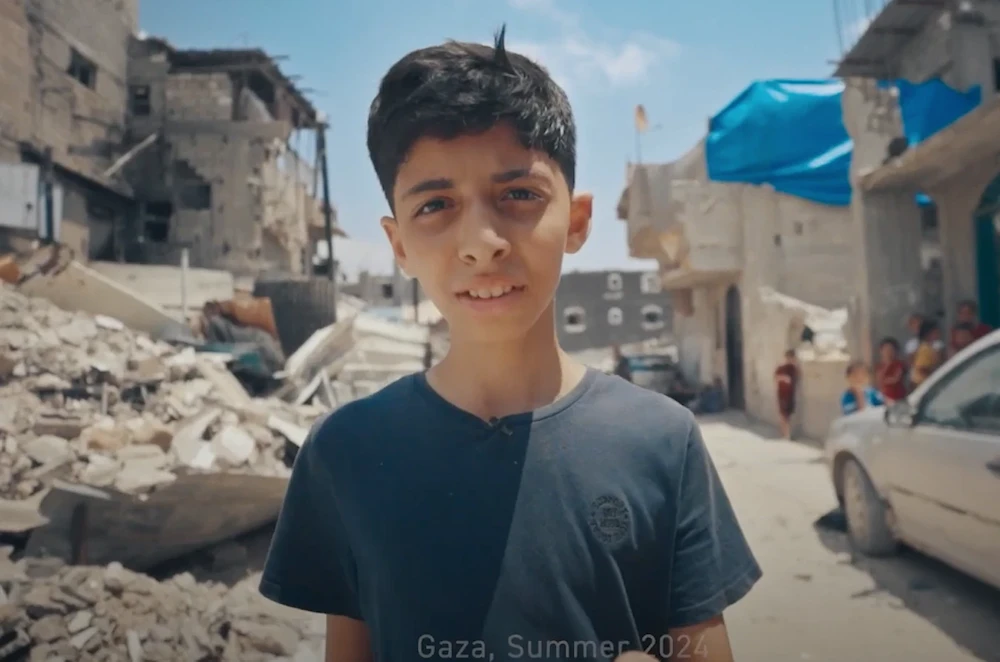BBC under fire for pulling Gaza report amid Israeli lobby pressure
The BBC's decision to withdraw the documentary followed pressure from pro-Israeli advocates, including the Israeli ambassador to the UK, as well as British officials.
-

This screenshot from the trailer for 'Gaza: How To Survive A War Zone' shows Palestinian child Abdullah Al-Yazouri. (Youtube screenshot)
The BBC has faced significant backlash following its removal of the documentary "Gaza: How To Survive A Warzone," which focused on the experiences of Palestinian children in the Gaza Strip.
The film came under intense scrutiny after it was revealed that one of its featured children, 13-year-old Abdullah Alyazouri, was the son of Dr. Ayman Alyazouri, a deputy minister in the Gaza government, which is led by the Palestinian Resistance movement Hamas.
Hamas has long defended Gaza in the face of Israeli military aggression, including the recent 15-month war that has resulted in the killing of over 48,300 Palestinians, most of them women and children.
The BBC's decision to withdraw the documentary followed pressure from pro-Israeli advocates, including the Israeli ambassador to the UK, as well as British officials such as Culture Secretary Lisa Nandy, who suggested that she would engage with the BBC over the matter.
While the BBC stated it was conducting “further due diligence” on the production, the decision sparked widespread debate about media impartiality and the portrayal of Palestinians in British media. The broadcaster noted that the film "features important stories" about the experiences of children in Gaza but would not be available on iPlayer while the review was ongoing.
The controversy intensified when it was revealed that Abdullah Alyazouri, the documentary's minor narrator, was the son of Dr. Ayman Alyazouri, a deputy minister in Gaza. Dr. Alyazouri’s background includes work with the UAE government and studying at British universities, which led a group of 45 Israeli journalists, including former BBC governor Ruth Deech, to send a letter demanding the film's removal. They labeled him a "terrorist leader".
However, many defended the documentary. Chris Doyle, director of the Council for Arab-British Understanding (CAABU), expressed disappointment over the decision, calling it "a shame" that the documentary was removed under pressure from anti-Palestinian activists who lacked empathy for the suffering in Gaza. He highlighted the film's “valuable insights” into life in the warzone and praised its high-quality production, urging the BBC to reinstate the film.
'A dangerous precedent'
The controversy also raised concerns about the BBC’s editorial independence. Richard Sanders, a prominent filmmaker and journalist, described the decision as “cowardly” and warned that yielding to pressure from pro-Israeli lobbyists would set a “dangerous precedent” for the media’s coverage of Palestinian stories.
The film, which depicted the challenges faced by Palestinian children living under constant threat from Israeli bombardments, was seen by many as a crucial tool in “humanizing” the plight of Gaza's youngest victims.
This dispute comes amid an ongoing humanitarian crisis in Gaza, worsened by "Israel’s" persistent violations of ceasefire agreements and the blockade imposed by Tel Aviv. Thousands of Palestinian civilians, including children, have lost their lives since the siege began, and shortages of food, water, and medical supplies continue to exacerbate the situation. Human rights organizations have labeled the situation as one of the worst humanitarian crises in the world.
Pro-Israeli figures have long targeted media portrayals of Palestinians, particularly those "humanizing" the experiences of Gaza’s children, as part of an effort to shield "Israel" from scrutiny over its actions in the Palestinian territories. Many view this as part of a broader strategy to silence Palestinian voices and limit international sympathy for their plight.
Read more: Palestine Action trash BBC HQ for downplaying Israeli crimes in Gaza

 4 Min Read
4 Min Read










